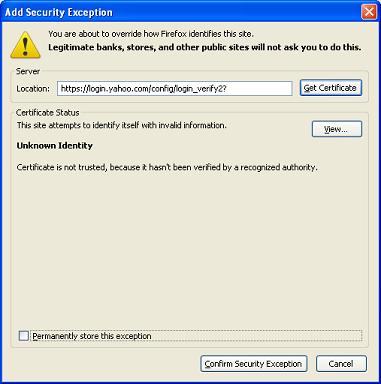PKI Tutorials - Herong's Tutorial Examples - v2.20, by Dr. Herong Yang
Outdated: Adding Security Exception in Firefox 35
This section provides a tutorial example on how to add a security exception in Mozilla Firefox to continue visiting an HTTPS Website with an un-trusted certificate.
What should you do when Mozilla Firefox tells you that "Your connection is not secure"? My suggestions is:
- Check the Website address to make sure you are not on a phishing site. For example, instead of yahoo.com you entered yah00.com, which could be a phishing site to steal your private data.
- Ask Mozilla Firefox to add an exception to let you continue to use this site.
- Or ask Firefox to show the certificate received from the site, review the certificate and fix the problem.
Here is what I did to add a security exception to pass the error page:
1. Open Mozilla Firefox to visit to https://login.yahoo.com again and wait for the error page.
2. Click the link "I Understand the Risks". Mozilla Firefox displays more warning messages:
If you understand what's going on, you can tell Firefox to start trusting this site's identification. Even if you trust the site, this error could mean that someone is tampering with your connection. Don't add an exception unless you know there's good reason why this site doesn't use trusted identification. [ Add Exception... ]
3. Click the "Add Exception" button. The "Add Security Exception" dialog box shows up:

4. Read messages on the dialog box carefully:
You are about to override how Firefox identifies this site. Legitimate banks, stores, and other public sites will not ask to do this. Server Location: https://login.yahoo.com/... Certificate Status - This site attempts to identify itself with invalid information. Unknown Identity - Certificate is not trusted, because it hasn't been verified by a recognized authority. [ ] Permanently store this exception
5. Click the "Confirm Security Exception" button. The Yahoo login page shows up.
I could continue to login to my Yahoo account and access my email box if I want to, because I can trust the Yahoo site.
Note that I left the "Permanently store this exception" checkbox unchecked, because I don't want Firefox to remember this exception. When I close Firefox and open it to visit https://login.yahoo.com, I want to see the error page again.
Table of Contents
Introduction of PKI (Public Key Infrastructure)
Introduction of HTTPS (Hypertext Transfer Protocol Secure)
Using HTTPS with Google Chrome
Using HTTPS with Mozilla Firefox
HTTPS with IE (Internet Explorer)
Android and Server Certificate
Windows Certificate Stores and Console
RDP (Remote Desktop Protocol) and Server Certificate
macOS Certificate Stores and Keychain Access
Perl Scripts Communicating with HTTPS Servers
PHP Scripts Communicating with HTTPS Servers
Java Programs Communicating with HTTPS Servers
.NET Programs Communicating with HTTPS Servers
CAcert.org - Root CA Offering Free Certificates
PKI CA Administration - Issuing Certificates
Comodo Free Personal Certificate
Digital Signature - Microsoft Word
Digital Signature - OpenOffice.org 3
PKI (Public Key Infrastructure) Terminology
Outdated: Viewing Server Certificate in Chrome 40
Outdated: Viewing Server Certificate in Firefox 35
Outdated: Viewing Pre-Installed Certificates in Firefox 35
Outdated: Firefox 35 Displaying Certificate Error Page
►Outdated: Adding Security Exception in Firefox 35
Outdated: Windows XP Component "Update Root Certificates"
Outdated: Creating Certificates Console on Windows XP
Outdated: Applying Digital Signatures with Word 2007
OutDated: Creating a Digital ID and Sign Word Documents
OUtdated: Viewing Digital ID Created by MS Word
Outdated: Obtaining a Trial Digital ID from ARX CoSign
Outdated: Viewing Digital ID Obtained from ARX CoSign
Outdated: Windows XP Component - Removing "Update Root Certificates"
Outdated: IE 8 Displaying Certificate Error Page
Outdated: IE 8 Displaying Certificate Error Icon
Outdated: Viewing Certificate Path Validation Error in IE 8